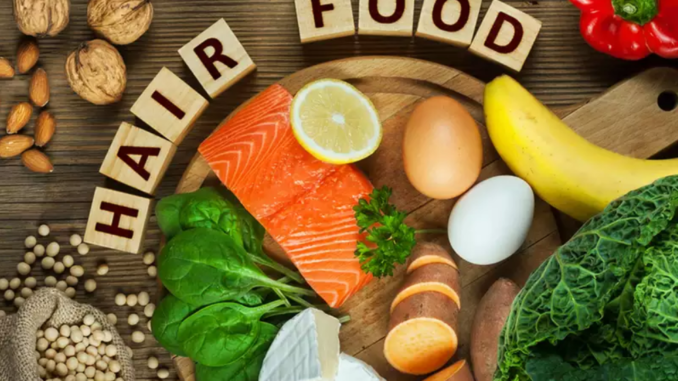
Suddenly if a person feels like their hair is taking off more than usual, or if they start noticing that their hair is extremely thinning, then one must be looking for a solution that will help them grow their hair. And additionally, one step that you may want to use is to change your diet, because undernourishment can be the reason for losing your hair. There are no foods or supplements that can guarantee hair growth, but you need to get enough vitamins, minerals, and nutrients to promote healthy hair growth.
However, your hair loss may be due to something other than diet.
“Even with a perfect diet and optimal nutritional intake, many factors such as genetics, stress, and health-related issues affect hair growth,” experts say. If you are worried about your hair loss, it is always best to consider consulting your health care provider regarding the issue and rectifying the issue related to your health. However, it’s best to start by adding particularly nutritious foods to your diet, so it doesn’t hurt to first make sure you’re doing well from a nutritional point of view. There are 14 foods to add to your diet that may promote hair growth.
Fish
As a wealthy supply of omega-three fatty acids and protein, fish can assist in maintaining the strands strong. But fish has many fitness advantages past assisting hair, which include lowering infection and reaping benefits to your nervous system.
Peanuts
Peanuts are high in biotin, which is believed to promote hair growth and prevent hair loss. A 1/4 cup serving has 9 grams of protein, 4 grams of fibre, and a unique antioxidant profile. Peanuts are also quite filling, making them an excellent vegetarian and vegan meat substitute.
Eggs
Eggs are high in protein and vital minerals including choline and vitamins A, D, and B12, all of which are beneficial to hair health. If you want to get the maximum vitamin D out of your scramble, keep the yolk in it. Lutein and zeaxanthin, two carotenoids contained in eggs, also play a role in cellular health, particularly in the eyes, skin, and hair.
Spinach
Spinach is high in magnesium, iron, and folate, which is one of the essential B vitamins. Other leafy greens, such as kale, provide nutrient-dense skin and hair advantages. Furthermore, the vitamin C in these dark green leafy vegetables helps to protect and maintain the cell membranes of hair follicles.
Meat
Many people’s diets include meat, which is high in nutrients that may help with hair development. Meat protein promotes hair growth by repairing and strengthening hair follicles. Cooked steak contains up to 29 grams of protein every 3.5-ounce (100-gram) meal. Red meat, in particular, is high in an easily absorbed form of iron. This mineral aids in the delivery of oxygen to all cells in the body, including hair follicles, through red blood cells. Hair loss has been linked to protein and iron deficiencies.
Soybean
Soybean has been shown in studies to improve hair development. One of these chemicals is spermidine, which is found in soybeans. In a trial of 100 healthy people, a spermidine-based dietary supplement, for example, was found to prolong the anagen period of active hair growth. A hair follicle will continue to grow as long as it is in the anagen stage. Spermidine has also been shown in test tubes to improve human hair development. However, because research on spermidine and hair development is still in its early stages, more research is required before health professionals can make spermidine consumption recommendations.
Shrimp
Shrimp is a popular shellfish that is high in nutrients that can aid in the development of hair. Shrimp, for example, has a high protein content, as well as B vitamins, zinc, iron, and vitamin D. Shrimp provides 38% of your daily vitamin D requirements. In studies, vitamin D3 deficiency has been linked to hair loss. Despite its low-fat content, shrimp contains a trace of omega-3 fatty acids. Diets high in omega-3 fatty acids have been linked to increased hair growth. Shrimp contain a lot of protein, B vitamins, zinc, iron, and vitamin D, all of which can help with hair growth. They also contain a small amount of omega-3 fatty acids, which are good for your health.
Oysters
Oysters are one of the best sources of zinc. Zinc is a mineral that promotes hair growth and restoration. A zinc deficiency in the diet may contribute to telogen effluvium, which is a common but reversible type of hair loss caused by a nutritional deficiency. According to studies, taking a zinc supplement can reverse hair loss caused by zinc deficiency. Too much zinc, on the other hand, may result in hair loss. Because foods like oysters contain zinc in small but healthy amounts, eating them instead of taking supplements may be preferable.
Sweet peppers
Sweet peppers contain a lot of vitamin C, which may aid in hair growth. A yellow pepper contains approximately 5.5 times the vitamin C content of an orange. Vitamin C promotes the formation of collagen, which strengthens the strands of your hair. It’s also a potent antioxidant, which can protect hair strands from oxidative damage. Oxidative stress occurs when free radicals outnumber the body’s antioxidant defence mechanism. Hair thinning and greying has been linked to it. Sweet peppers are also a good source of vitamin A. This vitamin may promote hair growth while also increasing sebum production, which keeps hair healthy.
Seeds
Seeds have a high nutrient density for a low-calorie count. Many of these nutrients may also aid in hair growth. Among them are vitamin E, zinc, and selenium. An ounce of sunflower seeds contains roughly half of your daily vitamin E requirements, as well as a variety of B vitamins that are good for your hair. Furthermore, omega-3 fatty acids are found in some seeds, such as flaxseeds and chia seeds. Flaxseeds, on the other hand, contain a type of omega-3 fatty acid that the body does not absorb as well as omega-3s found in fatty fish. Regardless, it’s an excellent addition to any diet.
Nuts
Nuts are delicious, convenient, and high in nutrients that may aid in hair development. An ounce (28 grams) of almonds, for example, provides 37% of your daily vitamin E needs. They also contain a variety of B vitamins, zinc, and essential fatty acids. A lack of any of these nutrients has been linked to hair loss. Aside from hair growth, nuts have been linked to a variety of other health benefits, such as reduced inflammation and a lower risk of heart disease. As a result, nuts are an excellent and simple way to diversify your diet.
Avocado
Avocados are delicious, nutritious, and packed with heart-healthy fats. They’re also high in vitamin E, which may aid in hair growth. One medium avocado (about 200 grams) provides 21% of your daily vitamin E needs. Vitamin E, like vitamin C, is an antioxidant that helps fight oxidative stress by neutralising free radicals. According to one study, people who had hair loss reported 34.5 percent more hair growth after taking a vitamin E supplement for eight months. Vitamin E also protects certain areas of the skin, such as the scalp, from oxidative stress and injury. Damaged scalp skin can result in poor hair quality and fewer hair follicles.
Grapes
Grapes, like other plant-based foods, contain antioxidant polyphenolic chemicals that may help decrease cellular damage. Grapes contain oligomeric proanthocyanidins (OPC), which serve to prevent the production of dihydrotestosterone, which is a major cause of hair loss. Hair follicles are also stimulated by OPC. Consuming roughly a cup of grapes every day can assist to reduce inflammation in your tissues.
Yogurt
Plain, unsweetened Greek yogurt is high in protein, which is essential for healthy hair growth. Plain Greek yogurt is also incredibly adaptable since it can be used to make a substantial breakfast (think smoothies and parfaits) as well as savoury dishes (like dips and condiments). Yogurt’s best feature is its probiotics, which are beneficial bacteria that aid with nutritional absorption.

Leave a Reply